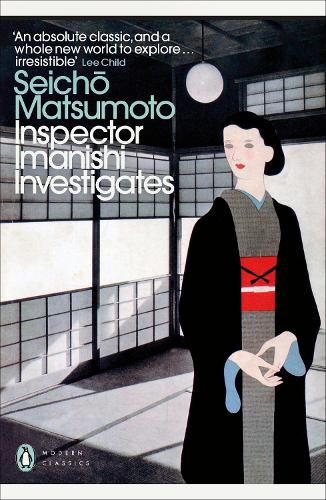
Inspector Imanishi Investigates
(Paperback)
Publishing Details
Inspector Imanishi Investigates
By (Author) Seicho Matsumoto
Translated by Beth Cary
Penguin Books Ltd
Penguin Classics
10th June 2025
6th March 2025
United Kingdom
Classifications
General
Fiction
Classic fiction: literary and general
Fiction in translation
895.635
Physical Properties
Paperback
352
Width 131mm, Height 198mm, Spine 21mm
259g
Description
A thrilling crime classic, from the bestselling author of Tokyo Express Tokyo, 1960. As the first rays of morning light hit the rails at Kamata Station, a man's body is found on the tracks. With only two leads - a distinctive accent and a single word, 'kameda' - Senior Inspector Imanishi Eitaro is called in to solve the puzzle. Setting aside his beloved bonsai and haikus, he must cross Japan in search of answers, from Osaka to Akita, accompanied by junior detective Yoshimura. At each new town, they encounter traces of the avant-garde Nouveau Group - young Tokyo artists who are bringing new ideas from the West. What to make of this modern collective And how to stop another mysterious death occurring Inspector Imanishi investigates . . . A fascinating glimpse into Japanese society at a time of great change, this is one of Seicho Matsumoto's best-loved novels - a riveting mystery from the master of Japanese crime.
Reviews
Beautiful and melancholic, Inspector Imanishi Investigates is not just an ingenious and elegant mystery, but a fascinating window into 1960s Japan -- Paula Hawkins
An absolute classic, and a whole new world to explore ... irresistible -- Lee Child
In this 1960s crime novel, the setting is as enticing as the plot... thoroughly satisfying -- Barry Turner * Daily Mail *
Reminds me of [John le Carr's] writing . . . fascinating . . . Its a moment of transition in Japan; new ideas are spreading, new contexts are forming. Theres traditional beauty still, but modernity is yammering to be let in . . . Highly recommended -- Nick Harkaway, author of Titanium Noir
Seicho Matsumoto's Inspector Imanshi Investigates explores post-war Japan, its anxieties and struggles for a new identity. With an engaging older detective and an enthusiastic younger sidekick, this is a book lovers of traditional crime fiction will understand and enjoy -- Ann Cleeves
A more considered work than Tokyo Express, although one similarly interested in train travel. Set in 1960, the writing brings up a Japan before high-speed trains, one that is more alive to differences, not least in dialect, between particular areas... A well-presented book... Deserves being in the library of all interested in detective fiction -- Jeremy Black * Critic *
The most intricate web of detection . . . A tantalizing double unveiling act . . . Belongs on your shelf next to Christie and Simenon, P.D. James and Robert Van Gulik. A superb thriller * LA Times *
A stylish mystery novel written by one of Japan's most popular authors . . . First-rate storytelling . . . Inspector Imanishi deserves to be welcomed to the ranks of international crime fiction * New York Times *
Patient, meticulous stories that offer an anatomy of a society as much as a picture of a crime * Economist *
A blood-drop on a cherry blossom, an ageless masterwork from the master himself, Seicho Matsumoto paved the way for Japanese crime fiction with good reason. Inspector Imanishi Investigates is a beguiling omakase of a novel a fascinating exploration of tradition versus modernity, a contemplation of human darkness and a silk-smooth murder mystery. As Imanishi investigates death, so too the reader investigates a post-war Japan in metamorphosis. Matsumoto etches himself in time with this elegy to the Japanese detective -- Nicols Obregn
Author Bio
Seicho Matsumoto was born in 1909 in Fukuoka, Japan. Self-educated, Matsumoto published his first book when he was forty years old and he quickly established himself as a master of crime fiction. His exploration of human psychology and Japanese post-war malaise, coupled with the creation of twisting, dark mysteries, made him one of the most acclaimed and best-selling writers in Japan. He received the prestigious Akutagawa Literary Prize in 1950 and the Kikuchi Kan Prize in 1970. He died in 1992.
